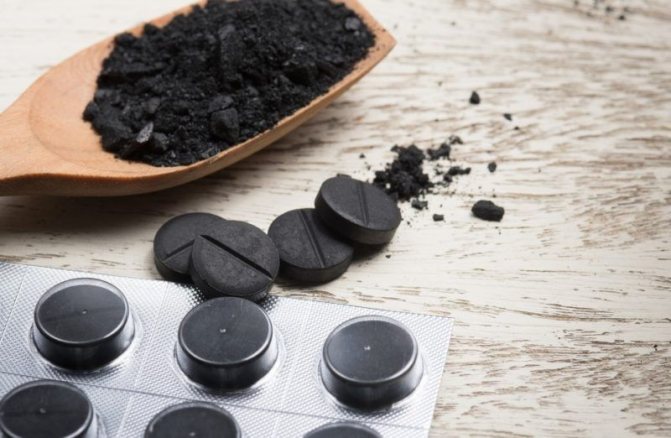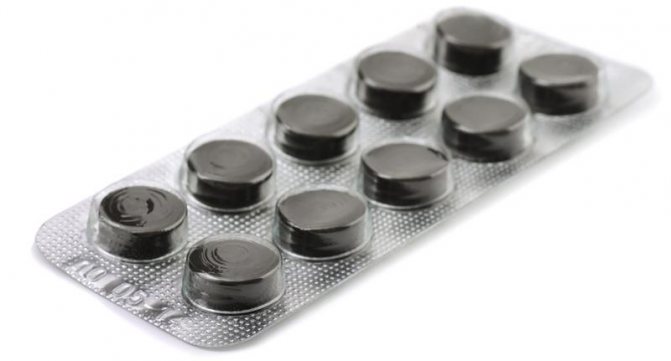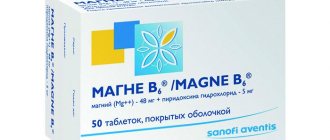Every nursing mother knows very well that during breastfeeding (BF) you should not take any medications. Any medicine should be taken only after prior consultation with a doctor, since the active components penetrate into breast milk through the circulatory system and then enter the newborn’s body. That is why many young mothers have a question: is it possible to use activated charcoal while breastfeeding or is it better not to use this pharmacological agent.
Activated carbon is one of the most popular medications designed to treat food poisoning and remove accumulated toxins from the human body. Activated carbon during breastfeeding is considered a completely safe and harmless medication, approved for use by nursing mothers.
Let's consider whether the woman's use of the drug will harm the child's body.
Indications for use
The drug is approved during lactation as a product made from a natural component that acts only in the intestines and potentially cannot affect the baby, unlike other drugs. The standard list of cases of use of activated carbon includes negative conditions caused by polyetiological reasons:
- intoxication due to intestinal infections (dysentery, salmonellosis, E. coli, toxic infections);
- complications of allergic reactions or the course of diseases of this etiology;
- poisoning caused by taking other medications, chemical compounds, salts of heavy metals, consumption of stale or low-quality products.
We recommend reading: Bread during breastfeeding
Since it acts directly in the intestines, without being absorbed into the blood, it is prescribed in all of the above cases, as well as when negative symptoms of the gastrointestinal tract appear. Coal is relevant for a nursing mother to protect the child during intrauterine development and breastfeeding, with stomach disorders accompanied by negative symptoms:
- mild food poisoning, accompanied by diarrhea, nausea, vomiting;
- increased gas formation, flatulence, dyspeptic disorders;
- heartburn, prolonged constipation;
- intoxication of any etiology.
Since the drug acts only in the intestines and does not enter the circulatory system, it is prescribed to allergy sufferers to reduce symptoms and allergen load, when other medications for hepatitis B are undesirable.
The administration of charcoal is sometimes the only way out for breastfeeding in dangerous or unpleasant conditions, but even activated carbon requires certain precautions during lactation, since it can cause the removal from the body of useful substances necessary for the baby. By abusing the medicine, minerals, trace elements, and vitamins that the child needs while breastfeeding can be removed from the body.
How to take charcoal during lactation?
There are developed rules for taking the drug for different conditions. For breastfeeding, activated carbon can be taken no more than 1 tablet (250 mg) per 10 kg. own weight. Alarming symptoms and the need to take a natural medicine are indications for its use. When feeding a baby with breast milk, this must be done following certain rules:
- the maximum dosage should not exceed 10 standard tablets of 250 mg (if the weight exceeds 100 kg, it remains the same);
- The optimal form of administration is powder; it is better to grind the tablets and wash them down with plenty of water;
- the drug is used immediately after feeding;
- if there is a need for emergency assistance, if there are alarming symptoms, the appointment time can be rescheduled by first expressing the collected milk in order to hold out until the next feeding, which can begin no earlier than 3 hours later;
- you need to take the medicine immediately after the baby has been fed;
- if symptoms continue in severe form, poisoning should be treated by gastric lavage, or call a doctor.
We recommend reading: Does alcohol pass into breast milk?
The main function of activated carbon during lactation is not prevention or relief of minor gas formation. Treating negative symptoms or removing toxins from poisoning are cases where you can swallow tablets or powder.
Side effects
Taking activated carbon during lactation can cause the following undesirable effects:
- dyspepsia;
- stomach upset;
- difficulties with bowel movements;
- hypovitaminosis and mineral deficiency that occur when taking activated carbon for more than 14 days in a row.
Due to the intake of the sorbent, the stool turns black, which is not a pathology and does not require discontinuation of therapy.
Activated carbon does not cause undesirable reactions from the central nervous system and does not slow down the reaction rate, so during lactation it can be drunk by mothers who drive a car or work with potentially dangerous devices.
Overdose
Despite all the positive properties of the product, it is impossible to take it uncontrollably, without observing the dosage. This will lead to the development of side effects.
Overdose will lead to:
- development of intestinal obstruction, colic;
- disruption of the metabolic process;
- the occurrence of allergies;
- constipation or, conversely, diarrhea;
- temperature rise.
Incorrect use during breastfeeding will lead to a deterioration in the woman’s condition, which will affect breast milk.
Activated carbon during breastfeeding

Activated charcoal is allowed to be taken while breastfeeding. It will help cope with poisoning and rid the body of toxins. However, the medicine is only safe when taken in the correct dosage. A nursing mother needs to know the rules for taking these pills during lactation, about contraindications and side effects.
Table of contents
|
What is activated carbon for?
The drug is available in tablets and is an absorbent. That is, it absorbs harmful substances. It attracts them to its surface and removes them from the body.
Activated carbon is prescribed to nursing mothers:
- with diarrhea;
- intestinal, viral or bacterial infections;
- increased acidity, gas formation, fermentation in the stomach;
- as preparation for examinations of the stomach or intestines.
Is it possible to use activated carbon during lactation?
Doctors allow this drug for nursing mothers. They indicate that such an adsorbent is one of the safest for mother and baby.
There are different opinions about how many tablets a nursing mother can take. A number of experts claim that during lactation it is forbidden to drink more than 10 tablets per day.
If you exceed the daily norm, there will be negative consequences for the baby.
Poisoning, colic, or an allergic reaction in the child is possible. The medicine can also cause growth and development delays in the baby. Pediatrician Komarovsky does not agree with this.
In his opinion, an overdose of adsorbent is practically impossible.
Signs of poisoning in a nursing mother
Food and drink poisoning can take several forms. One of the most common is acute gastroenteritis. The first manifestations occur 2-6 hours after eating low-quality food.
The state of health deteriorates sharply. Signs of food poisoning:
- loose stools;
- abdominal pain;
- vomit;
- weakness and dizziness;
- temperature increase.
A mild form of poisoning ends within 24 hours. If during this time the signs of the disease have not gone away, and the temperature is still high (38 degrees or more), you should immediately seek medical help.
This is how a mild form of intoxication turns into an acute one.
If poisoning is not dealt with in time, the usual symptoms will include low blood pressure, increased heart rate, and in some cases even convulsions.
The acute form of intoxication provokes an imbalance of salts and water in the body and dehydration.
Methods for treating poisoning during breastfeeding
In addition to taking activated carbon, you need to take a number of additional actions:
• Rinse the stomach with a solution of potassium permanganate. The water should be slightly pink. You need to drink 0.5-1 liter of solution at a time.
Then provoke a gag reflex. It is necessary to repeat this procedure until the stomach is cleared of food and bile.
• To prevent dehydration, you should drink more water. Also, the liquid will help rid the body of intoxication more quickly.
• Tea made from chamomile flowers will help relieve inflammation and calm the stomach, as well as get rid of fatigue.
One teaspoon of dry herbs is enough for a mug of boiling water. The drink can also increase milk production.
Useful tips for mothers: NURSING HEALTHY AND BEAUTIFUL MOTHER
How to take activated charcoal during lactation
Activated carbon cleanses the body well. But you should know that along with toxins, it removes beneficial substances from the body.
In order not to harm the baby, the mother must strictly follow the rules for taking these pills:
• If a woman continues to breastfeed despite illness, it is better to take the pill immediately after application. This way, until the next feeding, much less medicine will remain in the body.
• You can breastfeed your baby only 2-3 hours after taking the drug.
• Tablets work best if you crush them into powder and dilute them with cool water. For half a liter of water you need 20-30 grams of powder.
• You can calculate the required number of tablets by weight. One tablet is intended for every 10 kilograms. This means that with a weight of 70 kilograms, the required dosage is 7 tablets.
Contraindications and possible side effects
This drug is prohibited for intestinal bleeding, ulcers, and individual intolerance.
Activated carbon should not be taken in parallel with other antitoxic drugs. There will be no harm, but it will neutralize their effect.
When the mother takes these pills, the color of the baby's stool changes. It may become darker than normal or even black. This is normal and will go away in a short time.
The drug may cause loose stools or constipation in the mother. This is a common side effect and will go away soon.
If you take activated charcoal for more than 14 days, your blood pressure will drop and you may experience a lack of vitamins, proteins, fats, calcium and other substances necessary for the body.
Hormonal imbalance is also possible.
If the drug does not cope with the intoxication of the body, and its symptoms do not go away, it is time to go to the clinic.
Activated carbon is a reliable and safe means of combating toxins, harmful substances and various types of poisoning.
By taking it according to the rules, you can quickly come to your senses and calmly take care of your child and household chores. Knowing your weight, it is easy to calculate a single dose.
But if the disease cannot be overcome within 24 hours, it is better to consult a doctor about further treatment and the possibility of continuing breastfeeding.
- about the author
- Recent publications
Arina Nagovitsyna
author of the publication (site editor)
JOURNALIST Higher education: Faculty of Journalism and Mass Communications
Arina Nagovitsyna recently published (see all)
- What can a child at 3 months - 09/12/2019
- What a 2 month old baby can do – 09/11/2019
- Which formula to choose when mixed feeding - 09/10/2019
Mode of application
For acute poisoning and severe cases, the therapeutic dose is 1 tablet per 10 kg of body weight. That is, if a mother weighs 65 kg, she needs to take 6.5 tablets, which it is advisable to crush. And when mom wants to get rid of the feeling of bloating, it is enough to take 1-2 tablets once or up to 3 times a day.
In case of poisoning with chemicals or drugs, charcoal is used for gastric lavage. The tablets are ground and a solution is prepared in the ratio: 1 tablespoon of charcoal powder per 1 liter of water. The liquid suspension is taken in 0.5-1 cup doses, and the drug is introduced into the body both before washing (especially if there is food mass in the gastric tract) and after it. The drug has its maximum effect within the first 12 hours after poisoning.

Before use, it is recommended to crush the charcoal (bite it) and drink it with a sufficient amount of water.
Attention! You cannot take other medications at the same time as charcoal, since their therapeutic effect will be negligible due to adsorption, and the charcoal itself, due to the sorption capacity spent on pills, will have little room left to neutralize poisons.
Possible side effects
Doctors, answering the question whether a nursing mother can use activated charcoal, say that long-term use of the drug can cause the development of side effects.
They may manifest themselves in the following:
- If a woman takes it but does not stop breastfeeding, the baby's stool color changes. It turns black. This is not a pathology, after stopping taking it it returns to normal.
- Since the drug is passed through breast milk to the newborn, the newborn may become constipated.
- Taking the medicine for more than two weeks leads to a decrease in blood pressure, a lack of calcium and other nutrients in the body.
An overdose can cause hormonal imbalance.
Analogs of activated carbon for blood pressure
During lactation, instead of activated carbon, you can take other adsorbents:
- Enterosgel, which contains polymethylsiloxane polyhydrate as an active component. It does not interfere with the absorption of vitamins, micro- and macroelements, and does not change the microflora of the gastrointestinal tract. During lactation, you can take Enterosgel in the form of a gel and paste (only unsweetened) in the same cases as activated carbon. The medicine is prohibited if you are allergic to its composition, weakened intestinal motility and peristalsis. Enterosgel is usually well tolerated, but sometimes the medication can cause nausea and difficulty defecating. If a woman has impaired liver and kidney function, then an aversion to enterosorbent may develop.
- Filtrum-STI, which contains hydrolytic lignin as a medicinal component. It is available in tablets. It has the same indications for use as activated carbon. During lactation, Filtrum-STI should not be taken if the woman is intolerant to the substances contained in the tablets. The adsorbent is not recommended for use in cases of recurrent gastrointestinal ulcers and weakened intestinal tone. Taking pills may cause allergies or stool retention. If you drink Filtrum-STI for a long time during lactation, this can cause a deficiency of vitamins and calcium in the body, which will negatively affect the health of the mother and baby. To prevent this from happening, during the course of treatment with the sorbent it is recommended to take multivitamins and calcium-containing medications approved for lactation.
- Polyfan is available in powder for oral administration. It has the same indications for use as activated carbon. The powder should not be drunk during lactation if a woman has been diagnosed with intolerance to its composition, gastritis with low acidity, intestinal atony, erosive and ulcerative diseases of the digestive tract. Polyfan can cause allergies, stool retention, hypovitaminosis, and calcium deficiency.
- Enterumin is sold in powder form, from which a suspension for oral administration is prepared. The medicine adsorbs toxins on its surface and removes them from the body, it stops diarrhea. The sorbent is prohibited if you are allergic to its components and have bleeding from the digestive tract. Taking the drug during lactation may cause constipation.
It is permissible to take analogues instead of activated carbon during lactation only after consultation with a doctor, since each medication has its own characteristics.
Despite the fact that activated carbon is an over-the-counter product, drinking it during lactation is only permissible with the permission of a doctor, since only a specialist can decide how advisable it is to take it.
Is it possible to drink charcoal during breastfeeding?
You must understand that if the sorbent penetrates milk, then toxic particles will get in with it. Therefore, a nursing mother can take black pills only as prescribed by a therapist.
Mom will not just take the medicine, she will definitely get a consultation with a doctor, he will choose the optimal dosage for an adult woman so that less activated carbon goes to the baby during breastfeeding.
To prevent associated toxins from harming the baby, you must accurately follow the therapist’s instructions:
- do not exceed the dose. In case of poisoning, the dosage is standard - 1 tablet per 10 kilograms of body weight. When emergency assistance is not required, the limit is 2 tablets. For hepatitis B, the drug is taken once, but if the exacerbation continues, the medication can be taken for several days until the symptoms of the disease subside. You can take no more than 10 tablets per day;
- removal of the sorbent lasts 3 hours. If taking the medicine requires a different time, the mother should express milk. If the baby’s feeding schedule allows, then for these three hours you should simply not breastfeed;
- It is important to crush the tablets and dilute them with water before taking them;
- Correlating with the mother’s diet, the time to take the medicine is an hour after meals.
If the mother’s condition requires frequent and long-term use of the sorbent, it is necessary to temporarily stop breastfeeding so that toxic elements through the milk do not cause intestinal disorders in the baby.

Mother's milk contains antibodies that protect the baby. But the child’s body is not yet strong enough to fight the poisonous toxins that have entered. Lethargy and weakness of the child indicate his intoxication; If these symptoms occur, you should stop breastfeeding. And think about whether to take the sorbent or not, because it can be replaced with gentle analogues.










